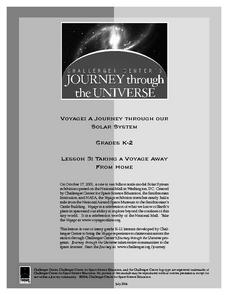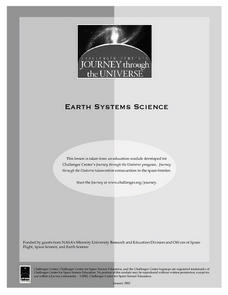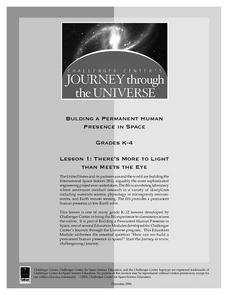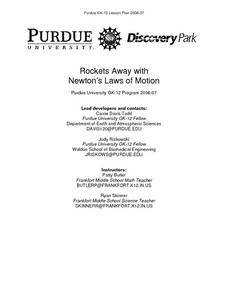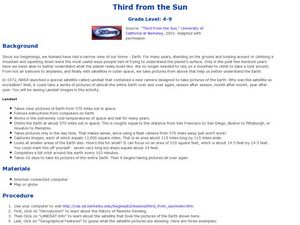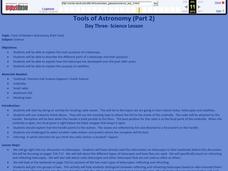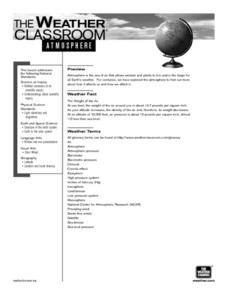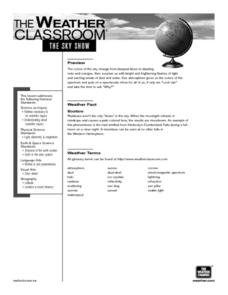Curated OER
Bringing the Solar System Down to Earth
Students develop a scaled down model of the solar system. In small groups, they calculate the scaled-down diameters of the planets and the sun, the scaled-down distance of the planets from the sun, complete two charts, and create a...
Curated OER
The Water Planet
Students use NASA photographs and hands-on activities to compare the amounts of land and water on our planet. They discover that the world has five oceans and that they cover seventy percent of Earth's surface. Students learn how this...
Curated OER
Taking a Voyage away from Home
Students experience and participate in a journey through a "Voyage" exhibition of the Solar System and the frontier it covers. They build a dynamic model of the Earth and Sun. Descriptions are given on the relative sizes of the Sun and...
Curated OER
Rust Never Sleeps
High schoolers investigate oxidation-reduction reactions involving iron by conducting an experiment in which they expose iron filings to different atmospheric and ocean conditions. They relate the results to the oxidation banding...
Curated OER
There's More to Light than Meets the Eye
Students explore the concept that not all light is visible to the
human eye. Although UV light is not visible, it can still be harmful, causing sunburns or skin cancer. They use special beads to detect UV light around the school....
Curated OER
Air and Water in the Environment
Students demonstrate an awareness of air as a substance that surrounds us and takes up space, and whose movement we feel as wind. They predict and describe how local weather conditions affect living things, including themselves.
Curated OER
A New Slant On The Seasons
Students identify how the tilt and position of the Earth causes the seasons. After a discussion of the seasons and when they begin. Using themselves as the objects in the universe, they role play how the rotational movement of the...
Curated OER
How Do We Explore Strange Environments?
Young scholars identify and label the different parts of a robot, rover, or a spacecraft. They discuss and record all of the features their robot will need to accomplish its mission and be able to explain why they chose these features...
Curated OER
Categorizing Celestial Objects
Students work together to develop a classification system for planets. They take a class vote and read an article about an astronomer's classification system. They write an essay on how scientists make decisions for the general public.
Curated OER
Rocks, Minerals, and Erosion
Students identify and describe rocks that contain records of the earth's history and explain how they were formed. They formulate questions about and identify needs and problems related to objects and events in the environment, and...
Curated OER
Rockets Away with Newton's Laws of Motion
Eighth graders comprehend Newton's Laws of Motion and to use the scientific method in rocketry sub-unit. They work through the scientific method. Students illustrate how science and Newton's Laws can be used in everyday situations and...
Curated OER
Density Challenge
Students calculate the densities of several liquids that appear similar. In this physical science lesson, students go beyond understanding the way liquids of different densities behave to researching how this knowledge applies in real...
Curated OER
Rocket Me into Space
Fourth graders study the concept of thrust and how it propels rockets into space. They discover why airplanes cannot travel into space while considering the engineering techniques use in designing rockets. They look at how space...
Curated OER
Third from the Sun
Students examine images from space. In this third from the Sun instructional activity, students examine images from, Landsat, the satellite launched by NASA in 1972.
Curated OER
Moon Observations
Students study the science of the moon. In this moon observations lesson plan, students study vocabulary associated with the moon, study a lunar calendar, and a phases of the moon's orbit around the Earth.
Curated OER
Out of This World
Students take a mission to Mars. In this space science lesson, students listen a lecture about space travel to Mars and the planet itself. Students then create timelines of exploration and write poetry about their ideal planet.
Curated OER
Tools of Modern Astronomy
Students differentiate refracting and reflecting telescopes. In this earth science lesson, students explain how they are closely connected to satellites. They complete the concept map at the end of the activity.
Curated OER
The Weather Classroom - Atmosphere
Meteorology learners explore the weight of air, layers of the atmosphere, and air pressure action through a series of discussions, demonstrations, and hands-on group activities. Enough discussion prompts, background information, student...
US Environmental Protection Agency
Carbon Through the Seasons
Meteorologists view an animated video by the Environmental Protection Agency to learn how the carbon cycle works, and then move into groups to analyze and graph actual data of the atmospheric carbon dioxide concentration from Hawaii's...
Space Awareness
The Intertropical Convergence Zone
Young scientists know it is hotter along the equator, but why is it also rainier? Through the process of completing two experiments and a worksheet, scholars discover the answer is the intertropical convergence zone. First, they...
Curated OER
Sky Show
Students participate in a discussion of the sky and colors. They watch a demonstration of how colors can change. They examine the issue of if weather should be a part of their coursework.
PHET
Planet Designer: Retro Planet Red
What does the atmosphere on Mars look like? This fourth lesson in the series of five is designed for high schoolers. Scholars apply previous knowledge to add atmosphere to Mars in an online simulation. This comprehensive lesson includes...
NASA
Stellar Fingerprints and Doppler Red Shifts
Young scientists observe the spectra of elements and compare that to the Doppler effect. Hook scholars from the beginning all the way to the extension activities in this 5E-format lesson.
NASA
Dark Matter NASA Conference
Young scholars calculate the escape velocity of planets in our solar system and use that knowledge to calculate the escape velocity for NGC 2300 group. They then suggest reasons for the escape velocity to be higher than possible given...




